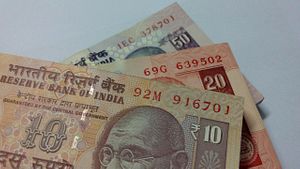India’s central bank, on Tuesday, announced a rate cut of 25 basis points, bringing the benchmark repurchase rate down from 6.5 percent to 6.25 percent. The decision is the first rate reduction by the Reserve Bank of India since the ascension of its new governor, Urjit Patel, and the first under a new governance framework, leaving policy decisions up to the vote of a monetary policy committee. The latest rate decision was approved unanimously by the committee.
The rate reduction drew positive reactions from business leaders, who’d long sought a loosening in Indian monetary policy despite the RBI’s inflation-targeting policy framework under Patel’s predecessor Raghuram Rajan. The RBI’s decision, moreover, comes after the U.S. Federal Reserve held off on a rate increase at its late-September meeting. Overall, with Tuesday’s rate decrease, Indian rates have come down 1.75 percentage points since January 2015.
Patel, largely bringing continuity to the RBI from Rajan’s inflation-sensitive approach, said that the reduction was “consistent with an accommodative stance of monetary policy.” Economists and commentators have suggested that the RBI’s move was in part influenced by the U.S. Federal Reserve’s decision to hold off on a rate increase while signaling that conditions remained favorable for a rate increase later in the year.
Moreover, the RBI, in its statement on the rate decision, cited slower-than-expected global growth. “Global growth has been slowing more than anticipated through 2016 so far, with weak investment and trade damping aggregate demand,” the RBI’s monetary policy committee said. “Meanwhile, risks in the form of Brexit, banking stress in Europe, rebalancing of debt-fuelled growth in China, rising protectionism and diminishing confidence in monetary policy have slanted the outlook to the downside.”
A range of recent and upcoming macroeconomic conditions affected the RBI’s decision, including the increase of civil servant pay by 23 percent under the 7th Pay Commission, the upcoming implementation of the Goods and Services Tax across India in early-to-mid 2017, and seasonal variance in food prices. On the latter, the monetary policy committee noted that it “expects that the strong improvement in sowing, along with supply management measures, will improve the food inflation outlook.”
“The sharp drop in inflation reflects a downward shift in the momentum of food inflation – which holds the key to future inflation outcomes – rather than merely the statistical effects of a favourable base effect,” it added.
































